It's a fairly good sized pond (as an estimate, I'd say around 12-15 metres). It's home to a lot of wildlife. There's a healthy population of great crested newts, a family of muntjac spend the hot days hunkered down in the shady undergrowth around the outside, bats roost in the trees above and all sorts of other creatures slither, scuttle and fly back and forth over the course of the day. There's also a nice variety of wild flowers present.
It's very overgrown and hasn't had much in the way of management/maintenance for a while.
Ponds are completely new territory for me. That being the case, I'm trying to figure out how much, if any, maintenance I should be carrying out. And, when those jobs should be done to minimise disturbance to the wildlife (mostly winter, presumably). The hand-over of this piece of land will most likely happen mid/late summer.
Some of the things to prioritise are:
- To encourage an environment that will support a diverse range of wildlife. If that means leaving the area to do it's own thing, that's fine. Likewise, if it means having to get my hands dirty and do some work, that's good too.
- Specifically support and maintain a breeding habitat for the population of great crested newts. They are a protected species and suffer from habitat loss, so finding out whether or not I should be actively working to support their habitat is important. There are also some organisations I will look to make contact with regarding this.
- Maintain it as a pond, rather than having it develop into a bog.
Any thoughts on the above points would be gratefully received, as would any other input about general management of wild pond areas. Like I say, ponds are totally new to me, so feel free to chuck in any advice.
Thanks.
Here are some photos of the area in question.
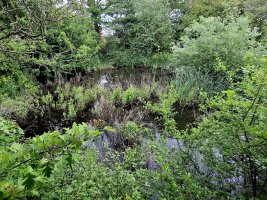
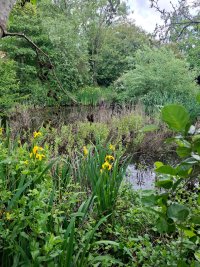
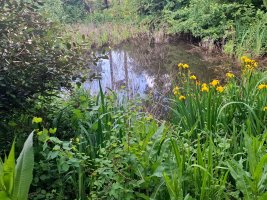
Edge of the pond
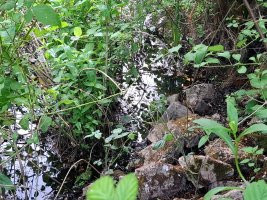
Approach to the pond
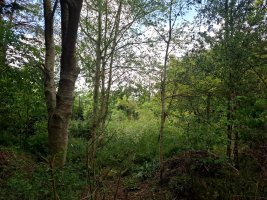
It's very overgrown and hasn't had much in the way of management/maintenance for a while.
Ponds are completely new territory for me. That being the case, I'm trying to figure out how much, if any, maintenance I should be carrying out. And, when those jobs should be done to minimise disturbance to the wildlife (mostly winter, presumably). The hand-over of this piece of land will most likely happen mid/late summer.
Some of the things to prioritise are:
- To encourage an environment that will support a diverse range of wildlife. If that means leaving the area to do it's own thing, that's fine. Likewise, if it means having to get my hands dirty and do some work, that's good too.
- Specifically support and maintain a breeding habitat for the population of great crested newts. They are a protected species and suffer from habitat loss, so finding out whether or not I should be actively working to support their habitat is important. There are also some organisations I will look to make contact with regarding this.
- Maintain it as a pond, rather than having it develop into a bog.
Any thoughts on the above points would be gratefully received, as would any other input about general management of wild pond areas. Like I say, ponds are totally new to me, so feel free to chuck in any advice.
Thanks.
Here are some photos of the area in question.



Edge of the pond

Approach to the pond

Last edited:
